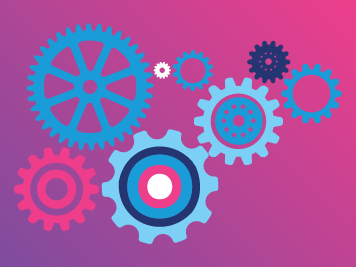Generation Z (Gen Z) makes up 25% of the global population and, by 2030, will constitute about 30% of the U.S. workforce. While Gen Z represents a smaller percentage of working adults than other generations, meeting their needs is an important consideration for employers. This is especially true as Baby Boomers near retirement age and exit the workforce.
But what do Gen Z workers really want? Let’s review the benefits identified as most important to Gen Z as well as retention strategies to keep them engaged.
Who is part of Gen Z, and what’s important to them?
Anyone born between 1997 and 2012 is part of Gen Z. The oldest individuals in the generation—about 26 years old—are already in the workforce. The youngest are preteens—around the age of 11. This is the first generation to grow up with the internet as a regular part of their daily lives, which impacts their work expectations and desires.
Gen Z individuals may be more likely to have certain make-or-break expectations for jobs, including:
- Social awareness: 49% of Gen Z workers consider a company’s stance on social issues a significant consideration in choosing and staying at a job, according to Ernst & Young. Often, members of Gen Z will pay attention to organizations' contributions to specific causes or non-profit organizations, as well as their social impact.
- Financial stability: The Gen Z workforce saw family and older friends tread through turbulent financial waters. As a result, this generation pays acute attention to daily finances and values retirement planning. Gen Z is 1.4 times more likely than older generations to report that money stresses them out.
- Well-being and mental health: Per Ogilvy research, 70% of Gen Z individuals stated that mental health needs the most attention or improvement. The value of employer-provided mental health benefit plans can’t be overstated. Deloitte found that 45% of Gen Zers reported work-related burnout—the highest among all generations.
Geopolitical and economic turmoil has been a regular part of Gen Z’s lives. As a result, this generation feels immense pressure to address global challenges and make fundamental, positive changes. In addition, compared to other generations, they’re more skeptical of capitalism, prioritize free time, and opt for healthy work-life balance over high salaries and career advancements.
What factors have turned Gen Z into who they are today?
This mix of trends, challenges, and milestones has helped shape Gen Z into a unique generation.
- The digital age: Gen Z has grown up with technology integrated into nearly every part of their lives. As a result, this generation relies on digital communication and innovation.
- Environmental anxiety: Growing up in the late 1990s and early 2000s, Gen Z was exposed to information about climate change and greenhouse gas emissions. Members of this generation believe they have a role in preserving the planet and their immediate surroundings. Many feel an innate responsibility to follow sustainable and green practices.
- The COVID-19 pandemic: Most notably, Gen Z was in school and going through important developmental milestones as the coronavirus spread, changing everyday routines and leading to feelings of increased isolation.
- Shifting financial stress: Fluctuating inflation levels have shaped how Gen Z chooses jobs, spends money, and prepares for the future. This is a shift from members of the previous generation who may have faced fewer challenges buying homes and saving for retirement.
Strategies to manage and retain Gen Z employees
Gen Z employees desire growth opportunities and skills training. They're individualistic, creative, entrepreneurial, and natural multi-taskers who bring fresh perspectives and abilities. Strategies to support retaining Gen Z talent include these benefits:
Comprehensive healthcare plans
While not a universal experience, many college students and young adults can’t afford to have regular health checkups. Health insurance from a full-time job can cover vital dental, vision, and general care. Gen Z’s most desirable health plan provides broad coverage for healthcare services like physician and emergency room visits and hospitalization.
Holistic health and well-being benefits
Gen Z workers generally desire plans focusing on more than just physical health. They want mental, financial, and emotional health benefits as well. Members of this generation may not have been working when mental health benefits started to gain traction, but they’re leading the charge in requesting holistic support in the workplace. This could include counseling services, mindfulness programs, and employee assistance programs. Organizations can demonstrate a commitment, not just to productivity levels and performance, but to how everyone is doing inside and outside of work.
Financial planning assistance
Gen Z values workplace benefits that help to get their finances in order and retirement savings underway. Employers can offer financial education programs, retirement savings plans, and competitive salaries. With such benefits, Gen Z talent can better manage financial assets in preparation for buying a home, getting married, traveling abroad, or purchasing a new car.
Tuition reimbursement
Most Gen Z workers graduated college within the last five years, which increases the chances they’re focused on paying back student loans. This becomes more challenging as interest rates rise and other daily expenses follow suit. Being in debt can cause mental and physical health problems as well as stress. However, employers can commit to supporting Gen Z’s well-being by providing tuition reimbursement or assistance with the loan payback process.
Flexible scheduling
Gen Z employees have likely watched older peers reach the point of burnout—something they don't want. Flexibility and a healthy work-life balance are priorities, as is the desire to lead fulfilling lives inside and outside the workplace. Achieving this could mean adjustable work hours and unlimited paid time off or personal time.
Remote work benefits
Given their comfort with technology, Gen Z employees find hybrid or remote work benefits and flexible scheduling very appealing. Such options give them the flexibility they seek and can allow them to prioritize their mental health and work-life balance.
Development opportunities
As tech-savvy go-getters, it's not uncommon for a Gen Z worker to combine fresh ideas with technology to create new ways of working. At the same time, they desire growth opportunities that enable them to hone their skills. Employers could develop an internal talent marketplace where workers can identify opportunities that interest them and allow them to test responsibilities outside of their current position.
How all working generations overlap
Baby Boomers, Gen X, Millennials, and Gen Z all have different life experiences, face unique challenges, and hold varying work attitudes and expectations.
But all four generations agree on a few main points:
- Flexibility is vital: 59% of employees across all generations expect remote work flexibility, with 44% ranking it a top-three factor for an ideal company, according to Oyster. On top of that, most workers—regardless of their generation—would choose flexible work over similar compensation offers, per McKinsey & Company.
- Employee engagement is low: In all four generational groups, Gallup found that 59% of workers don’t feel engaged and 18% are actively disengaged, bringing more people to look for new job opportunities outside their current companies.
- Cost of living is high: Inflation has driven the cost of living up for each generation, causing many Americans to worry about finances. When workers are worried about money, they can become distracted, reducing their motivation and work performance.
- Stress and mental health resources are paramount: Boomers, Gen X, Millennials, and Gen Z all experience some form of strain on their mental health, with 44% feeling constantly stressed on average, according to Gallup. This percentage rises to 68% for Gen Z respondents and younger Millennials.
Become an employer for all generations
According to our research, the average Gen Z worker desires comprehensive health plans customizable to their unique needs and situation. They perceive rising healthcare and pharmaceutical costs as a threat to their financial security and mental health. These factors push them to prioritize holistic care that lowers their out-of-pocket expenses.
Better understand Gen Z and the other generations represented at your company with help from Marsh McLennan Agency.
Download our 2024 Employee Benefits Trends Report: The Evolving Workforce to learn what Gen Z workers look for in employment and equip your company to make the best decisions for your staff.
Reach out to a Marsh McLennan Agency specialist today to discover how your organization could improve your employer-offered benefits plan for better talent attraction and retention.



